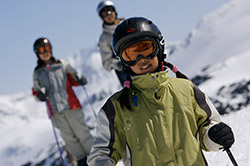Page Content
Health

Nutrition
In order to safely participate in any outdoor activity, you need to properly fuel and hydrate your body. Before heading outside, grab a nutritious snack such as a piece of fruit, yogurt, a handful of nuts and some water or juice to hydrate and pump up your energy stores. Pack an additional nutritious snack and water to take along. Check Canada's Food Guide for healthy eating guidelines and nutritional tips.
Dehydration
Your normal daily fluid intake requirement can be significantly affected by exercise, sweating, heat and altitude. Be sure to monitor your hydration and drink before you feel thirsty – sometimes your body cannot recognize that you’re thirsty if you’re already dehydrated.
Watch for early symptoms of dehydration including decreased coordination, lethargy, and impaired thinking. Left untreated, dehydration can eventually lead to heat cramps. If you feel symptoms of dehydration or heat cramps, replenish lost fluids and electrolytes through a sports drink or by eating salty foods and drinking water. If you experience severe dehydration symptoms such as heat cramps, drink plenty of fluids, cool down and immediately seek emergency medical help.
Frostbite
Frostbite is when your skin begins to freeze due to prolonged exposure to cold conditions. It usually happens to your feet, ears, nose, or fingers, but any skin that’s exposed can be affected. Dress properly – in warm layers and with a hat, scarf and gloves - to prevent frostbite. Watch for symptoms including white or yellowish-gray skin that looks swollen or waxy; itchy, tingly, painful or numb skin; blistering (in severe cases).
If you feel symptoms of frostbite, immediately get indoors and into warm, dry clothing. Warm the affected body part by immersing it in warm water until the sensation returns. CAUTION: Do not use hot water! Get medical attention as soon as possible.
Hypothermia
Hypothermia is abnormally low body temperature resulting from exposure to cold temperatures. Dress properly – in warm layers and with a hat - to prevent hypothermia. Watch for symptoms including shivering, confusion, slurred speech, drowsiness, low energy.
If you feel symptoms of hypothermia immediately get indoors and into warm, dry clothing. Wrap yourself in a warm blanket and drink a warm beverage (not alcohol or hot coffee). Get medical attention as soon as possible.


